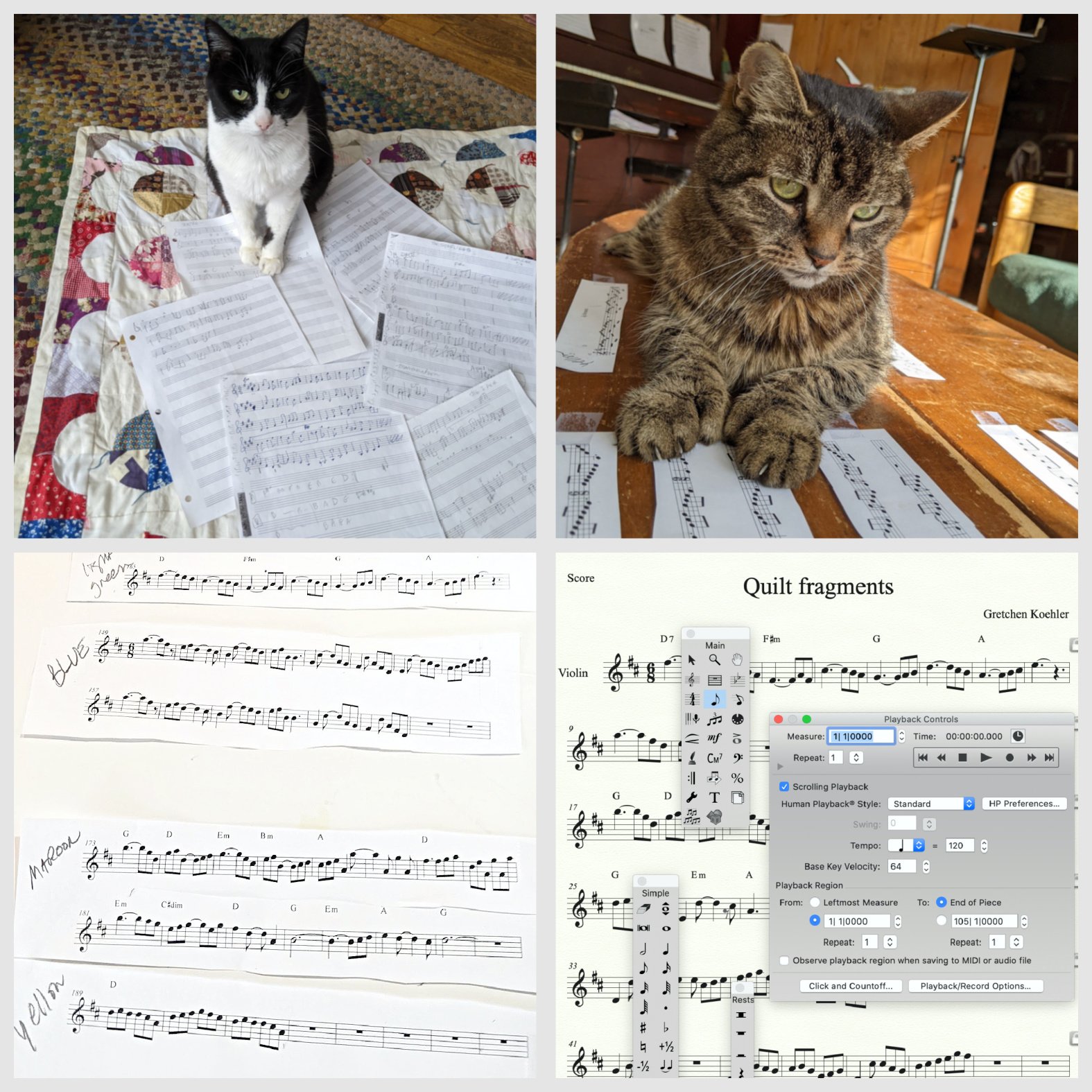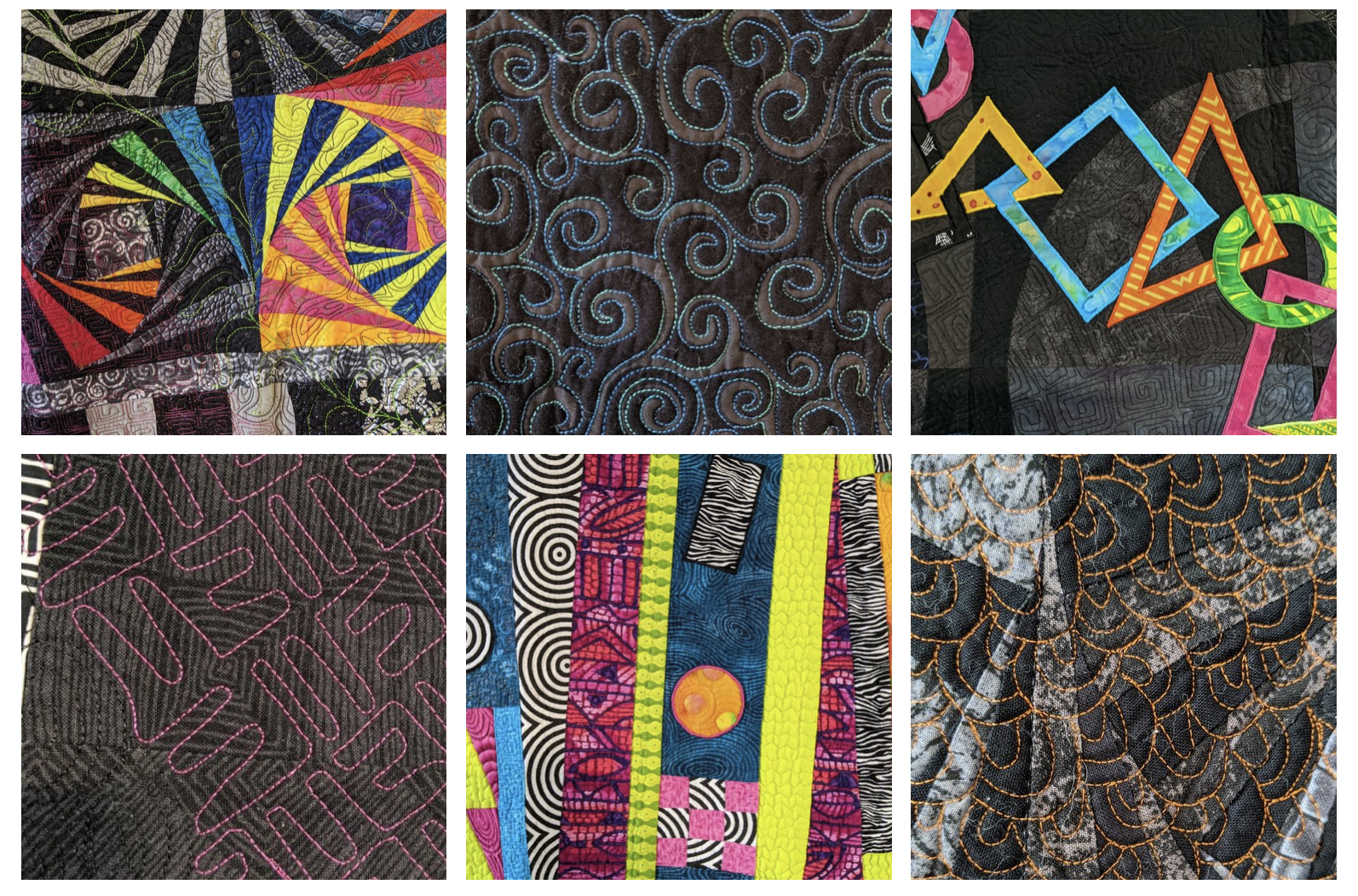QUILTING a new jig feat. Rebecca Muir MacKellar: "THE BOBBIN"
CLICK HERE TO WATCH MUSIC VIDEO.
“Fair Still The Moonlight” by quilter Rebecca Muir MacKellar. (Koehler photo)
FIDDLING WITH TRADITIONS
Fiddler Gretchen Koehler & quilter Rebecca Muir MacKellar in front of her quilt, “Tall Tom.” (Koehler photo)
In early 2022, I began a project called “Fiddling with Traditions” and set out to compose a new collection of tunes inspired by conversations with Northern New York artists. After the pandemic “pause,” I was in search of new ways to think about approaching music. With the support of Traditional Arts in Upstate New York [TAUNY] I conducted interviews with a variety of artists from silversmiths to rug braiders and not only composed a new North Country suite of tunes, but also wrote blog articles and produced a series of music videos featuring these extraordinary folks.
REBECCA MUIR MACKELLAR, quilter
I met quilter Rebecca Muir MacKellar in her home studio in Canton, NY. From the first step through her door, I was met by a burst of color on every wall. What an absolute pleasure!
Quilts by Rebecca Muir MacKellar, Canton, NY. (Koehler photos)
LEARNING TO QUILT
Becky learned how to sew her own clothes when she was a young girl from her mother Jeannette Tousley Muir. Her mom came to quilting by chance, fell in love with it, and went on to become a renowned quilter, highly respected quilting judge and author. Becky has fallen in love with quilting, too. To put it mildly, she has pushed the boundaries of traditional quilting into what many would label a fine art. I was struck by the elements of painting and sculpture embodied by her work and as a musician, I was drawn to her quilting rhythm, from the fabric to the shapes, to the thread. Becky’s quilts are made with intricate and thrilling designs, impeccable detail and masterful techniques. They are full of exquisite color that comes from her gorgeous fabric collection, as well as her own hand dying, and sometimes from paint she applies directly to the fabric. To quilt the layers together, she has drawers and closets full of a rainbow of threads.
“To put it mildly, Becky has pushed the boundaries of traditional quilting into what many would label a fine art.”
A small fraction of the rainbow of thread at Rebecca Muir MacKellar’s studio. (Koehler photo)
Rebecca Muir MacKellar’s quilt “Rhumba” was displayed at her organ recital and unvailed just before she played the dance. (Koehler photo)
CREATIVE PROCESS
As we talked about her creative process, it was clear she is motivated by a challenge. The challenge may come from her quilting group, “The Fiberistas,” who create gorgeous “slice quilts” once a year, or the challenge may come from within, a favorite of mine being that she makes a companion quilt for each piece she plays in her organ recitals.
A traditional “Monkey Wrench” with a modern twist. (Koehler photo)
TRADITION
We talked about tradition. I asked her what quilters from 100 years ago might say if they saw one of her quilts and she responded that they’d probably have a heart attack. I knew exactly what she meant. When you’re pushing boundaries, there are going to be traditionalists that give you “the look.” Heck, I’m an Old Time fiddler who plays with a jazz piano player and we have raised a few eyebrows. But overwhelmingly, Becky has gotten very high praise from the quilting community. Koehler & Kelly has also been embraced by the traditional music community who appreciate that folk music, like quilting, is a “living” tradition.
The key to my approach to the fiddling of my youth, is that I know and love my roots in traditional New England dance music and it will always be the foundation of my playing. In a similar way, Becky is fond of incorporating traditional quilt squares as a jumping off point for her designs. Those familiar with quilting will recognize the common “Monkey Wrench” quilt squares that dance all around her quilt, “Rhumba.” (Quilt photo above.)
Guided by her artist eye (fabric choices, color combos, quilting style, etc) she points out the “torque” (ie tilt) she often puts in her work. As two musicians, we talked about the many ways torque might be represented in the soundscape I was going to compose.
“Traditional dance music will always be the foundation of my playing. In a similar way, Rebecca is fond of incorporating traditional quilt squares as a jumping off point for her designs.”
“Finally a Quilt for Ian & Becky’s Bed” by Rebecca Muir MacKellar. (Koehler photo)
A “Fiberista” challenge resulted in Rebecca Muir MacKellar’s exquisite “Dark Sunflower.” (Koehler photo)
ADVENTURE
I was truly amazed at what Becky could achieve with fabric and thread combined with her immense talent and imagination. Her quilts were surprising and wonderful. In terms of composing, I had always composed fiddle tunes following the most basic AABB form. Nothing too surprising in my tunes. But, perhaps I could start with AABB form… and see where it goes.
“I was truly amazed at what Becky could achieve with fabric and thread combined with her immense talent and imagination.”
Quilter Rebecca Muir MacKellar working in her home studio. (Koehler photo.)
“My time spent with Becky inspired me to be more adventurous in my compositions.”
“Wild and Whacky African Quilt” by Rebecca Muir MacKellar. (Koehler Photo)
A note to myself from June 2015 reading, “Jig I’ll Write.”
CHALLENGE
Something she said gave me an idea. She mentioned that you “can’t force a quilt.” She said sometimes the ideas don’t come or don’t work and you have to set it aside. That got me thinking of all the half-baked tunes I had scribbled in my music notebook that I never come back to. I laughed at one scribble I made in 2015 titled “jig I will write.” In Becky’s spirit, I felt I needed to give myself a formal challenge. Before I knew it, I presented myself with the challenge to use up the bulk of these unfinished ideas in one tune …and I immediately regretted this decision! I spent the next few days composing reminding myself that it’s not called a challenge for nothing!
“I formally presented myself with the challenge to use up these unfinished ideas in one tune. I spent the next few days reminding myself that it’s not called a ‘challenge’ for nothing!”
Rebecca Muir MacKellar’s ice dyed fabric. (Courtesy of Rebecca Muir MacKellar)
FABRIC OF MUSIC
I laid out all my sheets with jig fragments and sat with them for a while. I couldn’t break from AABB form. Then I had an idea. I took some scissors, cut out the phrases, and thought of them as pieces of fabric instead of music. I actually assigned each phrase a color and got excited as something shifted in my way of approaching a tune. All of a sudden, I could imagine how this might work.
Piecing a musical patchwork together under the supervision of the Koehler cats. (Koehler photo.)
PATCHWORK OF A TUNE
I liked how I could move around the strips and try out combinations until I was satisfied. I started to patchwork the piece together. The colors really helped me see past the AABB form I was clinging to. When satisfied, I “stitched” them together with tape, entered the handwritten notes into my music software “Finale,” and added chords. Next step was to present my musical patchwork to Daniel Kelly for some piano quilting.
“I thought of my musical phrases as pieces of fabric. I assigned each phrase a color and got excited as something shifted in my way of approaching a tune.”
QUILTING
If you are unfamiliar with quilting, something practical I learned from Becky is that “quilters quilt a quilt.” Very basically, a quilt is a layering of fabrics (ie front, middle, back layer) that are “quilted” together with little stitches that bubble around on the surface. When I saw Becky’s “Liberation” quilt, it was all I could do to keep from taking my finger and following the quilting from one swirling pathway to the next. This was the image I explained to Daniel during our Zoom rehearsals. We talked about how the fiddle would provide the fabric and the piano would be the thread. This tune was going to be such fun to quilt together!
“We talked about how the fiddle would provide the fabric and the piano would be the thread. This tune was going to be such fun to quilt together! ”
Details of quilts by Rebecca Muir MacKellar. (Koehler photos)
LISTENING GUIDE (Video link below)
This piece is an imaginary journey following all of the stitches of a quilt, from the vantage point of 6 inches from the surface. The piece starts with the rhythm of the sewing machine. The 6/8 jig meter flows sometimes into 9/8 meter (slip jig) as a nod to the “torque” that Becky adds to many of her pieces. Each section is a color that the fiddle plays to represent the fabric. The piano quilts it together using bold thread choices, rhythmic pulses and free improvised stitching. The jig begins with 2 standard jig phrases as an homage to traditional jig form, then breaks the AABB form to embark on a jig of adventure. As the jig comes to a close, the sewing machine slows and the pizzicato of the fiddle signals the last thread being snipped. We call this piece, “The Bobbin.”
To Becky- You opened me up to such a new musical experience. Your work is positively stunning. Thank you for spending time with me and being a part of “Fiddling With Traditions.” ~Much admiration, Gretchen
And here is the official music video!! Click on the arrow and enjoy!!
Fiddler Gretchen Koehler filming “The Bobbin” for Fiddling With Traditions featuring the quilts of Rebecca Muir MacKellar.














